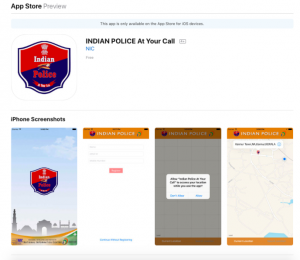Based on the FIR that you file, the police will conduct an investigation. The result of that investigation will be submitted by the police to the Court in the form of a charge sheet. At this point the judge will decide on whether the person who is being accused is guilty or not. This is when the criminal case actually begins. To explore more on the process of charge sheet, read our explainer on Charge sheet.
Theme: First Information Report (FIR)
What is the difference between an FIR and a private complaint?
FIR can be filed with the police for cognizable offences. A private complaint can be made to the Magistrate for both cognizable and non-cognizable offences.
I am not able to go to the police station. Is there any other way I can file an FIR?
Yes, you can call 100 and register an FIR with them. Some states even allow registering an FIR online.
I am a victim of a crime, but because of certain fears, I did not report it immediately. Would it affect my case if the FIR was registered late?
In most cases, delay in filing an FIR is not fatal to the case. If explained well, even long delays can be condoned. But it largely depends on the amount of time that has passed since the occurrence of the offence and various other factors. However, the delay in itself cannot be a reason for discarding the case.
Can the police refuse to register my FIR?
No, it is mandatory for the police to register an FIR. If they do refuse, the information can be sent to the Superintendent of Police in writing. He may conduct the investigation himself or order his subordinate police officers to carry it out
What is the value of an FIR in a case? Why do I have to file it?
Though not regarded as evidence per se, an FIR is the most valuable document in the entire criminal process. It is the basis on which the police investigate the particular offence and frame their charge sheet accordingly.
Who can file an FIR
You can file an FIR if you are:
- A victim of a crime.
- A relative or friend or acquaintance of the victim.
- You have knowledge about a crime that has taken place or is about to take place.
It is not necessary that you must have all information about the crime in order to file an FIR. But it is important that you report everything you know to the police.
An FIR in itself is not a criminal case filed against someone. It is just information received by the police relating to the commission of a crime. A criminal case begins when the chargesheet is filed by the police before the Court and a Public Prosecutor is appointed by the State.
How to file an FIR
If a crime has taken place:
- Go to the nearest police station: The police station does not necessarily have to be in the area where the crime has been committed. Please download the ‘Indian Police at your call’ app to find the nearest police station.
For Android Users:
https://play.google.com/store/apps/details?id=in.nic.bih.thanalocator&hl=en

For Apple Users:
https://itunes.apple.com/in/app/indian-police-at-your-call/id1177887402?mt=8

When you go to the police station to file the FIR, the following happens:
- You will be directed to the Duty Officer. You can either verbally tell the officer what happened, or write down the details yourself. If you tell the police verbally, then they must write it down.
- The Duty Officer will then make an entry in the General Diary or Daily Diary.
- If you have a written complaint with you, please carry two copies and give them to the Duty Officer. Both will be stamped and one will be returned to you. The stamp bears a Daily Diary Number or DD No. and is proof that they received your complaint.
- Once the police have read it out, if all the details are correct, you can sign the FIR. You have the right to get a copy of the FIR for free. Note the FIR number, date of FIR and the name of the police station. In case you lose your copy, you can use these details to access the FIR online for free.
After registering the FIR, the contents of the FIR cannot be changed. However, you can give additional information to the police later on at any point.
In some states and cities, certain kinds of FIRs and complaints can be registered online. For example, in Delhi an online complaint can be filed for cases of missing persons or children, unidentified children or persons or dead bodies, senior citizen registration, stolen or unclaimed vehicle search or missing stolen mobile phones.
Where can an FIR be filed
An FIR can be filed at any police station. The fact that the crime may not have been committed in that police stations jurisdiction has no consequence to the filing of the complaint. It is mandatory for the police to record the information provided, and then transfer it to the police station in whose area/jurisdiction the offence took place. For instance, if a crime was committed in North Delhi, the information can even be registered with a police station in South Delhi.
This concept is generally referred to as “Zero FIR” and was introduced in 2013. Before the introduction of Zero FIR, massive delays were caused because the police station would record the information only in the area where the crime occurred.
FIRs filed for Women Related Offences
If you want to give information about any of the following offences, then such information has to be registered by a woman police officer or any other woman officer:
- Grievous hurt by use of acid
- Voluntarily throwing or attempting to throw acid
- Assault or criminal force on a woman with the intent to outrage her modesty
- Sexual harassment
- Disrobing
- Voyeurism
- Stalking
- Rape
- Rape causing death or persistent vegetative state
- Rape by husband when spouses were separated
- Gang Rape
- Outraging the modesty of a woman by words, gestures or actions
For offences committed from C to L mentioned above, if the same was committed or alleged to have been committed on someone who is suffering from some mental or physical disability (both temporary or permanent), then such information will be recorded by a police officer at their residence or any place that is convenient to the person reporting. Depending on the circumstances, they can even request an interpreter or a special educator.
Chargesheet
Once you have reported the crime by filing an FIR, the officer in charge must send the report to a Magistrate, who will take note of the case without any unnecessary delay, and proceed with the investigation. This is a mandatory step that the police have to follow, as it allows the Magistrate to take control of the investigation, and if necessary give appropriate directions to the police.
The police will investigate the facts and circumstances of the case, and if necessary, take measures to find and arrest the person committing the crime. If the police officer feels that the case is not of serious nature, he may appoint a subordinate officer to do the investigation. Also, if they think that there are no sufficient grounds to investigate further, they may not do so.
When the Police are done with their investigation and have found enough evidence to proceed with a criminal case, they file a charge sheet. However, after investigation, if they have not found anything proving the commission of a crime, they will suggest closing the case by filing a closure report to the Magistrate.
It is the filing of the charge sheet where the trial of a criminal case begins. The police do not have a time limit to file the charge sheet or a closure report. Even the Magistrate cannot compel the police to file the charge sheet in a particular period of time. But if the person accused of a crime is in jail, then they have either 60 days (where the punishment for the crime is less than 10 years) or 90 days (where the punishment of the crime is more than 10 years) to file the charge sheet.
Where to complain when Police Officer refuses to take your FIR
If a Police Officer does not accept your complaint then you can write down your complaint and send it to the Superintendent of Police. If the Superintendent feels that there is merit in your case, then he or she can appoint Police personnel to start an investigation in the same.